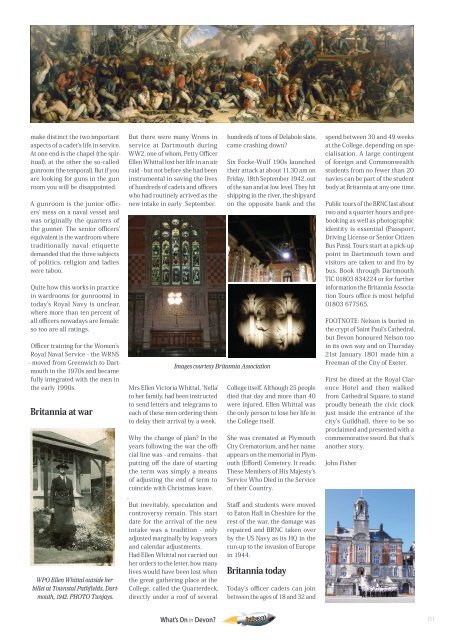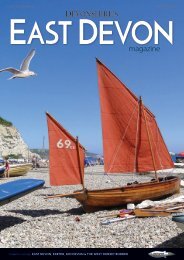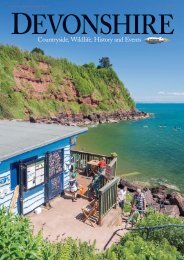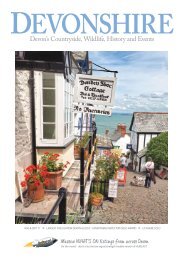Devonshire October November 16
Create successful ePaper yourself
Turn your PDF publications into a flip-book with our unique Google optimized e-Paper software.
make distinct the two important<br />
aspects of a cadet’s life in service.<br />
At one end is the chapel (the spiritual),<br />
at the other the so-called<br />
gunroom (the temporal). But if you<br />
are looking for guns in the gun<br />
room you will be disappointed.<br />
A gunroom is the junior officers'<br />
mess on a naval vessel and<br />
was originally the quarters of<br />
the gunner. The senior officers'<br />
equivalent is the wardroom where<br />
traditionally naval etiquette<br />
demanded that the three subjects<br />
of politics, religion and ladies<br />
were taboo.<br />
Quite how this works in practice<br />
in wardrooms (or gunrooms) in<br />
today’s Royal Navy is unclear,<br />
where more than ten percent of<br />
all officers nowadays are female:<br />
so too are all ratings.<br />
Officer training for the Women’s<br />
Royal Naval Service - the WRNS<br />
- moved from Greenwich to Dartmouth<br />
in the 1970s and became<br />
fully integrated with the men in<br />
the early 1990s.<br />
Britannia at war<br />
WPO Ellen Whittal outside her<br />
billet at Townstal Pathfields, Dartmouth,<br />
1942. PHOTO Twojays.<br />
But there were many Wrens in<br />
service at Dartmouth during<br />
WW2, one of whom, Petty Officer<br />
Ellen Whittal lost her life in an air<br />
raid - but not before she had been<br />
instrumental in saving the lives<br />
of hundreds of cadets and officers<br />
who had routinely arrived as the<br />
new intake in early September.<br />
Mrs Ellen Victoria Whittal, ʻNella’<br />
to her family, had been instructed<br />
to send letters and telegrams to<br />
each of these men ordering them<br />
to delay their arrival by a week.<br />
Why the change of plan? In the<br />
years following the war the official<br />
line was - and remains - that<br />
putting off the date of starting<br />
the term was simply a means<br />
of adjusting the end of term to<br />
coincide with Christmas leave.<br />
.<br />
But inevitably, speculation and<br />
controversy remain. This start<br />
date for the arrival of the new<br />
intake was a tradition - only<br />
adjusted marginally by leap years<br />
and calendar adjustments.<br />
Had Ellen Whittal not carried out<br />
her orders to the letter, how many<br />
lives would have been lost when<br />
the great gathering place at the<br />
College, called the Quarterdeck,<br />
directly under a roof of several<br />
Images courtesy Britannia Association<br />
hundreds of tons of Delabole slate,<br />
came crashing down?<br />
Six Focke-Wulf 190s launched<br />
their attack at about 11.30 am on<br />
Friday, 18th September 1942, out<br />
of the sun and at low level. They hit<br />
shipping in the river, the shipyard<br />
on the opposite bank and the<br />
College itself. Although 25 people<br />
died that day and more than 40<br />
were injured, Ellen Whittal was<br />
the only person to lose her life in<br />
the College itself.<br />
She was cremated at Plymouth<br />
City Crematorium, and her name<br />
appears on the memorial in Plymouth<br />
(Efford) Cemetery. It reads:<br />
These Members of His Majesty’s<br />
Service Who Died in the Service<br />
of their Country.<br />
Staff and students were moved<br />
to Eaton Hall in Cheshire for the<br />
rest of the war, the damage was<br />
repaired and BRNC taken over<br />
by the US Navy as its HQ in the<br />
run-up to the invasion of Europe<br />
in 1944.<br />
Britannia today<br />
Today’s officer cadets can join<br />
between the ages of 18 and 32 and<br />
spend between 30 and 49 weeks<br />
at the College, depending on specialisation.<br />
A large contingent<br />
of foreign and Commonwealth<br />
students from no fewer than 20<br />
navies can be part of the student<br />
body at Britannia at any one time.<br />
Public tours of the BRNC last about<br />
two and a quarter hours and prebooking<br />
as well as photographic<br />
identity is essential (Passport,<br />
Driving License or Senior Citizen<br />
Bus Pass). Tours start at a pick-up<br />
point in Dartmouth town and<br />
visitors are taken to and fro by<br />
bus. Book through Dartmouth<br />
TIC 01803 834224 or for further<br />
information the Britannia Association<br />
Tours office is most helpful<br />
01803 677565.<br />
FOOTNOTE: Nelson is buried in<br />
the crypt of Saint Paul’s Cathedral,<br />
but Devon honoured Nelson too<br />
in its own way and on Thursday<br />
21st January 1801 made him a<br />
Freeman of the City of Exeter.<br />
First he dined at the Royal Clarence<br />
Hotel and then walked<br />
from Cathedral Square, to stand<br />
proudly beneath the civic clock<br />
just inside the entrance of the<br />
city’s Guildhall, there to be so<br />
proclaimed and presented with a<br />
commemorative sword. But that’s<br />
another story.<br />
John Fisher<br />
<br />
hubcast<br />
.co.u k<br />
111


















